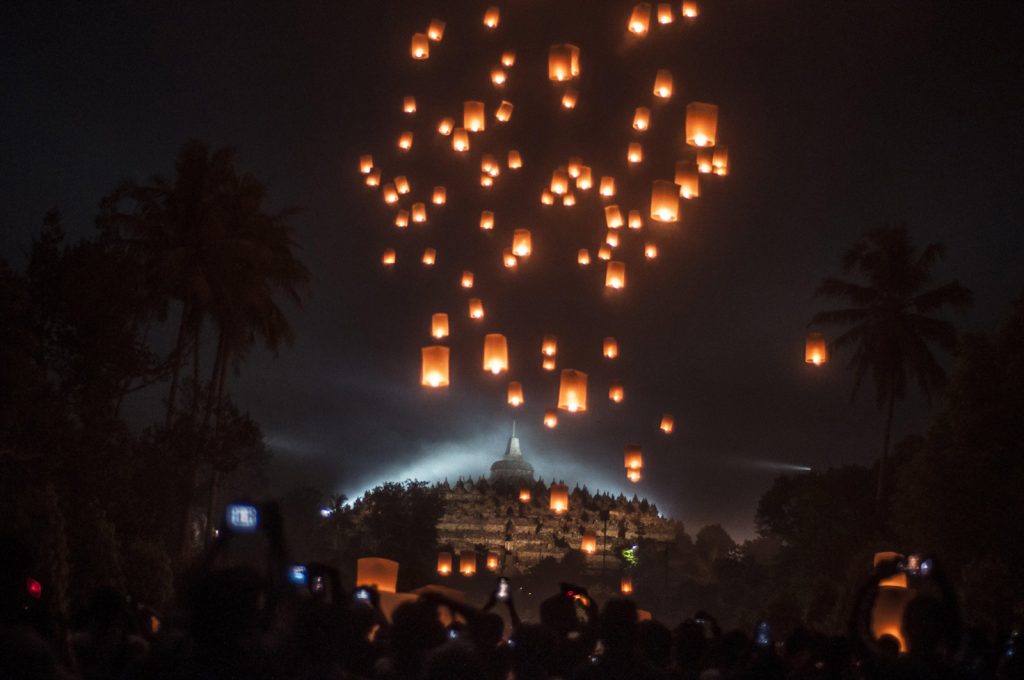Nothing is permanent, so everything is precious. Here’s a selection of some happenings—fleeting or otherwise—in the Buddhist world this week.
Buddhists Around the World Celebrate Vesak
On May 19, Buddhists around the world celebrated Vesak, the holiday that marks the birth, death, and enlightenment of the Buddha. In Sri Lanka, the festivities were subdued following the April 21 bombings by Islamic extremists, and last week’s attacks by Buddhist extremists on Muslim-owned homes, businesses, and mosques. According to Reuters, witnesses reported that the number of worshippers at Keleni Raja Maha Viharaya—a temple near the city of Colombo that some worshippers believe dates back to the time of Shakyamuni Buddha—appeared significantly lower than the previous year. Despite more stringent security, a sense of unease about safety may have been the cause. As one woman commented, “I still feel unsafe and will make a floral offering at the temple and return [home] as soon as I can.” In Vietnam, the United Nations hosted the UN Day of Vesak for the third time, the Star reports. Festivities spanned three days and were attended by over 20,000 Vietnamese Buddhist dignitaries and monastics. In line with the UN’s Sustainable Development Goals, event workshops covered “responsible leadership for sustainable peace, Buddhist approaches to family issues, healthcare, education, morality, responsible consumption,” as well as other issues. In Indonesia, thousands gathered at a ceremony outside Borobudur Temple in Magelang, where monks recited prayers and mantras before participants filled the night sky with lanterns as a symbol of enlightenment. Meanwhile, United States Secretary of State Michael Pompeo wished “peace and joy” to Buddhists around the globe. “The Buddhist community in the United States contributes to the strength of our country and our people, and Buddhism’s contributions to the world over more than two thousand years have enriched our culture and our history,” the statement reads.
Sri Lanka President Pardons Buddhist Hardliner
With little explanation, Sri Lanka President Maithripala Sirisena pardoned a hardline Buddhist monk on Wednesday, only a week after violent anti-Muslim riots allegedly organized by Buddhist nationalists swept through the country, Al Jazeera reports. Officials had accused Galagoda Aththe Gnanasara, leader of the “Buddhist Power Force,” of inciting violence against Muslims and Christians—both minorities in the majority-Buddhist nation—before his 2016 arrest and subsequent conviction on contempt of court charges for interrupting a journalist’s trial, according to Al Jazeera. The previous week, three other Buddhist nationalist leaders were arrested for allegedly stoking a violent mob that attacked Muslim establishments over several days and left one man dead.
Myanmar Style Story a Bad Look for New York Times
Human rights advocates have criticized the New York Times for the “insensitive” use of chic high-fashion photography in a recent article about Myanmar for T Magazine, the paper’s style publication. While reporter Rafia Zakaria’s article delves into the genocidal violence in Myanmar—where the military has forced more than a million members of the Rohingya ethnic minority to flee to refugee camps in neighboring Bangladesh—the images (below) tell another story, displaying models with designer labels and advertising the price (a $690 Burberry scarf and $1,890 dress, for example.) “The idea that genocide and mass atrocities would be a suitable backdrop to sell luxury fashion is not only insensitive, it’s reprehensible,” Matthew Smith, co-founder and chief executive at Fortify Rights, told Coconuts Yangon. And Khin Mai Aung, a New York–based lawyer and Burmese activist for greater rights in Myanmar, tweeted, “Not only was it it in poor taste for @nytimes to promote a high fashion photo shoot in a story about human rights concerns in #Myanmar but extremely incongruous & odd storytelling.”

Taiwan Legalizes Same-sex Marriage
On May 17, Taiwan became the first country in Asia to legalize same-sex marriage, the New York Times reports. The recent legislation comes two years after Taiwan’s constitutional court struck down the legal definition of marriage as exclusively between a man and woman, and less than one year after referendums indicated strong voter opposition to a same-sex marriage law. Taiwan has been described as “leader” of gay rights in Asia, and its annual gay pride parades attract hundreds of attendees from other countries in the region. While some of the weddings of the past week were decked out in secular rainbows, in 2012 Tricycle congratulated You Ya-ting and Huang Mei-yu, the couple who married in the country’s first “gay Buddhist wedding,” officiated by a Buddhist nun. Buddhism is the predominant religion of the small island nation.
A Meditation App for People of Color
A new app called Liberate Meditation is highlighting meditations from and for people of color, featuring teachers such as Ruth King, Sebene Selassie, Gina Sharpe, Bhante Buddharakkhita, and Mushim Patricia Ikeda. Early users were thrilled: One reviewer wrote, “I’m a yoga and meditation teacher and I am a POC. I literally cried when after I tried the first guided meditation on this app. Creating spaces—even virtually—for POC to find healing and solace in this practice is everything!” Said another, “You will not just meditate, you will be found.”
Thank you for subscribing to Tricycle! As a nonprofit, we depend on readers like you to keep Buddhist teachings and practices widely available.
